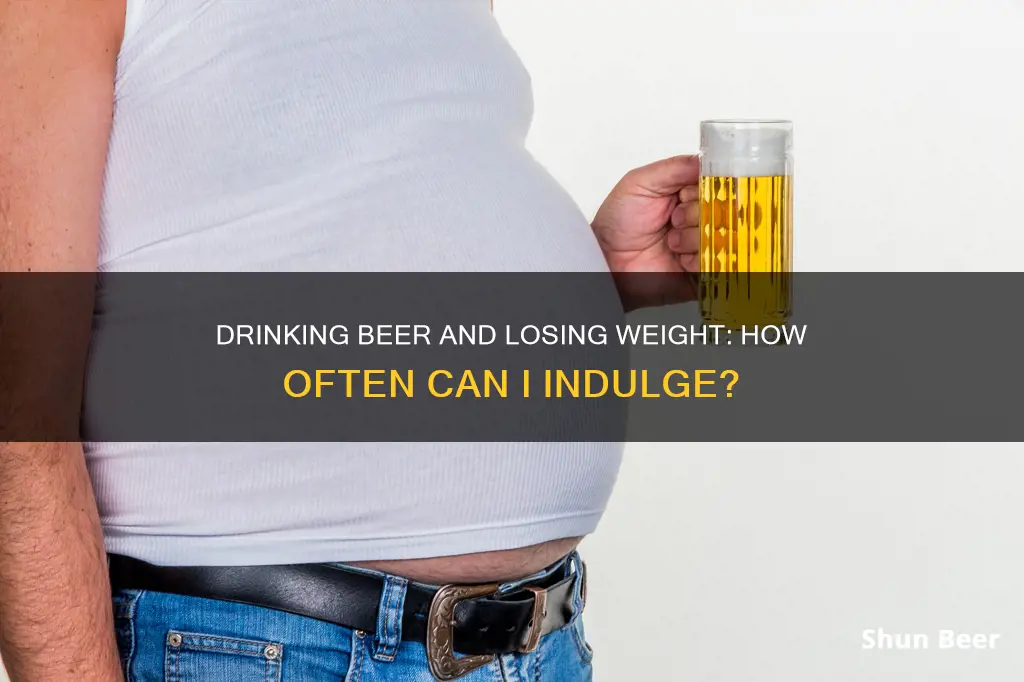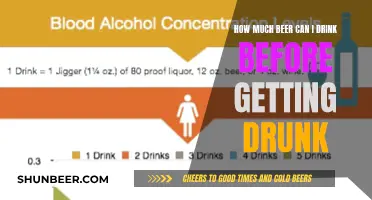
Beer is a popular alcoholic beverage, but it can be challenging to include it in a weight loss plan. Beer contributes calories without providing a sense of fullness, and its alcohol content can disrupt fat-burning processes, sleep patterns, and self-control, making weight loss more difficult. However, with strategies like limiting consumption, choosing lower-calorie options, and adjusting eating habits, it is possible to enjoy beer in moderation while losing weight. The key lies in finding a healthy balance and making informed choices to support weight loss goals.
| Characteristics | Values |
|---|---|
| Calories | Beer contains calories, with alcohol providing around 70% of them. |
| Nutrition | Beer is an "empty calorie" drink as it provides almost no nutrients. |
| Metabolism | Alcohol is treated as a toxin by the body, which can slow down fat metabolism and cause weight gain. |
| Sleep | Beer can negatively impact sleep quality, which is linked to weight gain and muscle loss. |
| Self-control | Beer can reduce inhibitions and increase the likelihood of overeating. |
| Strategies | Limiting beer intake, drinking light or low % ABV beer, reducing portion sizes, and drinking less frequently are strategies to lose weight while drinking beer. |
What You'll Learn

Beer is an empty calorie drink with almost no nutrients
Beer is an empty-calorie drink with almost no nutrients. This means that it provides a lot of calories without offering any nutritional benefits. Alcoholic beverages are made up of water, ethanol, and variable amounts of sugars and carbohydrates, but they lack proteins, vitamins, and minerals.
The calories from alcohol are often referred to as 'empty calories' because they have no nutritional value and are consumed in addition to the calories your body needs. These calories are also burned differently by the body. While your body can store nutrients, protein, carbohydrates, and fat, it needs to prioritise getting rid of alcohol, which is toxic. This process interrupts other essential functions like absorbing nutrients and processing fat.
Beer, in particular, is challenging for those trying to manage their weight. It is in liquid form, which means you can consume calories very quickly. Additionally, beer does not fill you up, so you can easily drink multiple beers and still have room for a full meal afterward. The alcohol in beer also inhibits your self-control, making you more likely to eat more food than you usually would.
Furthermore, drinking alcohol can stop the process of fat burning completely. It temporarily prevents your body from burning fat, as it cannot store calories from alcohol for later use. Instead, your metabolic system has to stop what it's doing to get rid of the alcohol, leading to the storage of fat. This is why heavy alcohol consumption is linked to increased waist size and central body fat.
In summary, beer is considered an empty-calorie drink because it provides a significant number of calories while lacking essential nutrients. This can make it challenging for individuals trying to lose weight, as the calories from beer are often consumed in addition to a full meal, and the body prioritises eliminating alcohol over burning fat.
Drinking Beer on the Strip: What You Need to Know
You may want to see also

Drinking alcohol can stop the process of fat burning
Alcohol is often referred to as "empty" calories as it provides your body with calories but contains very few nutrients. Alcoholic drinks are high in calories, with a 12-ounce can of beer containing 155 calories and a 5-ounce glass of red wine containing 125 calories. A night out with several drinks can lead to consuming a few hundred extra calories.
When alcohol is consumed, it is burned first as a fuel source before your body uses anything else. This includes glucose from carbohydrates or lipids from fats. As a result, the excess glucose and lipids are stored as fat in the body.
Alcohol can also affect your liver, which plays a role in the metabolism of fats, carbohydrates, and proteins. Excess alcohol consumption can lead to alcoholic fatty liver, which can damage your liver and affect the way your body metabolises and stores carbohydrates and fats.
In addition, alcohol can negatively affect your sleep, leading to an imbalance in the hormones related to hunger, satiety, and energy storage. It can also inhibit proper digestive function, causing stress on the stomach and intestines, and leading to decreased digestive secretions and movement of food through the tract.
Expired Beer: Is It Safe To Drink?
You may want to see also

Beer may negatively affect your sleep
Alcohol is a sedative that interacts with several neurotransmitter systems that regulate sleep. While it may help you fall asleep faster, it can also disrupt your sleep later in the night. Acute administration of large amounts of alcohol before sleep leads to decreased sleep onset latency and changes in sleep architecture early in the night, when blood alcohol levels are high, with subsequent disrupted, poor-quality sleep later in the night.
Alcohol abuse and dependence are associated with chronic sleep disturbances, lower slow-wave sleep, and more rapid eye movement sleep than normal, lasting long into periods of abstinence and potentially playing a role in relapse.
One weight loss study found that people who slept 5.5 hours vs. 8.5 hours lost 50% of their weight from muscle. Another study found that sleep-deprived people had a 45% increase in appetite for high-carbohydrate, calorie-dense foods. Sleep is also important for activity levels and the quality of workouts, so a good night's rest may help you feel more energized and motivated to exercise.
Additionally, alcohol inhibits REM sleep, which is often considered the most mentally restorative phase of sleep. A study by Finnish researchers found that alcohol significantly affected sleep quality, regardless of consumption level. They found that low alcohol intake reduced sleep quality by 9.3%, moderate intake by 24%, and heavy intake by nearly 40%.
To minimize the negative impact of alcohol on sleep, it is recommended to allow at least three hours between your last drink and bedtime, drink water along with alcohol, and avoid alcohol close to bedtime, especially if you are taking sleeping pills.
Beer and Kidney Disease: What You Need to Know
You may want to see also

Beer may inhibit your self-control
When you drink beer, your inhibitions may lower, and you may find yourself saying or doing things you wouldn't normally do. This lack of self-control can also extend to your eating habits. Beer does not fill you up, but it does provide calories, so you may find yourself eating more food than you would without the beer. This is especially true if you are drinking beer with your meal or going out with friends after drinking.
The effect of beer on self-control can be mitigated by limiting the number of beers you consume per week. You could try having one beer a day or, better yet, saving your drinking for the weekend, with perhaps two beers on Friday or Saturday. Being clear about the number of beers you will have in a week will help you significantly. Once you have reached your goal weight, you may not need to be as strict, but it is still a good habit to keep.
If giving up beer completely is not an option for you, you can also try adjusting your eating habits based on your drinking habits. For example, if you are having a burger and a couple of beers, skip the fries and focus on lean protein sources and vegetables instead.
Beer Drinking: Benefits and Limits for Better Health
You may want to see also

Beer is high in calories
Beer also negatively affects your sleep. The alcohol from beer can disrupt your sleep, and you may need to get up several times during the night to go to the bathroom. Lack of quality sleep is directly linked to weight gain and muscle loss. A study found that people who slept 5.5 hours versus 8.5 hours lost 50% of their weight from muscle. Another study found that sleep-deprived people had a 45% increase in appetite for high-carbohydrate, calorie-dense foods.
Beer may also inhibit your self-control. When people get drunk, their inhibitions fly out the window, and they may eat more food than they would have without the beer. Beer also does not fill you up, but it does provide calories. If you drink five beers (around 750 calories), you will still have room in your stomach to eat a full meal afterward. This is why drinking beer can make losing weight very difficult.
Wolf River, TN: Beer Drinking Allowed?
You may want to see also
Frequently asked questions
Drinking beer can cause weight gain due to its high calorie content. To lose weight, it is recommended to limit beer consumption to 1-2 beers per week.
Moderate drinking is defined as 1-2 drinks per day for men and up to one drink for women. One drink of beer is 12 fluid ounces of 5% ABV beer.
Drinking beer at night can negatively impact sleep quality. Lack of quality sleep is linked to weight gain and muscle loss.
Beer can increase appetite, especially for high-calorie foods. Alcohol triggers the release of dopamine and ghrelin, leading to hyperphagia or an abnormally increased appetite.
Strategies include drinking light or low % ABV beer, reducing portion sizes, drinking less frequently, and choosing lower-carb beers. Alternating beer with water and drinking only after eating a meal can also help.







